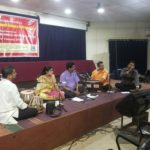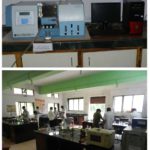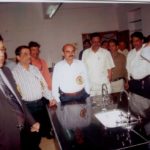About Department
Chemistry impacts every aspect of our daily lives from health and nutrition to climate change. Chemistry is the vibrant, vital and central science because it bridges other natural sciences, including biology, physics and geology. Important research areas like drug design, material science, nanotechnology and most importantly, ‘green chemistry’ are beneficial to both humanity and the environment. A vast array of industries – petrochemicals, bulk and fine chemicals, polymers, dyes & paints, pharmaceuticals, food additives & nutraceuticals are chemistry related and offer a wide range of rewarding careers.
The department was established in the year 1996-97. It offers B.Sc. (Three yrs. Degree) course and M.Sc. (Two Years Post Graduation) Course. The first batch of students graduated in 1999. The MSc course in Organic Chemistry was introduced in 2007 and Analytical Chemistry in 2015 in response to students’ need for a P.G. degree program. The department is Aided up to UG level. The Department has well equipped labs. The department’s Goal is to make Learning easy & Interesting. The teaching staff insists on use of advanced teaching tools like OHP & LCD projectors. The teaching staff also works on interdisciplinary research projects.
Students are encouraged to make oral and PowerPoint presentations, give seminars to enhance their creativity, communication skills and confidence. Innovative teaching methodologies incorporated in the regular teaching program help to develop and maintain students’ interest in chemistry. Some of these are:
- Wide use of ICT by both staff and students
- Experimental demonstrations
- Use of molecular models for organic and inorganic chemistry
- Guest lectures on topics in frontier areas of chemistry
- Industry visits / field trips
- Crosswords and quizzes
- Poster presentations

Dr. Ghanasham B. Sathe
Assistant Professor, (Head of the Department & Co-ordinator M.Sc.)
M.Sc., B.Ed., M.Phil., Ph.D., CSIR-NET, SET
Organic Chemistry
Year of Joining 1997
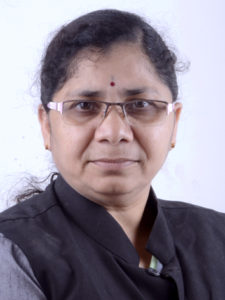
Prof. Mrs. Ganga S. Gore
Assistant Professor
M.Sc., M.Phil.
Physical Chemistry
Year of Joining 1999
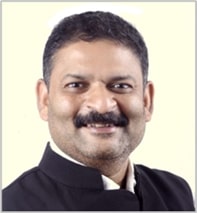
Prof. Kailas V. Gandhi
Assistant Professor
M.Sc. M. Phil.
Organic Chemistry
Year of Joining 2000

Prof. Santosh S. Marathe
Assistant Professor
M.Sc. M. Phil.
Organic Chemistry
Year of Joining 2001

Dr. Bapu A. Yamgar
Assistant Professor
M.Sc. Ph.D.
Inorganic Chemistry
Year of Joining 2011

Prof. Manoj N. Lad
Assistant Professor
M.Sc.
Organic Chemistry
Year of Joining 2011

Prof. Mr. Shantanu Kadam
Assistant Professor
M.Sc.
Organic Chemistry
Year of Joining 2018

Dr. Vijay Laxman Gurav
Assistant Professor
M.Sc., Ph.D. , SET
Year of Joining 2023

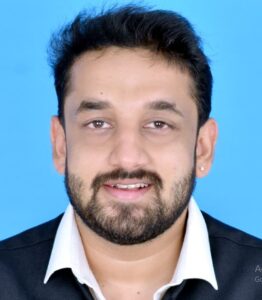
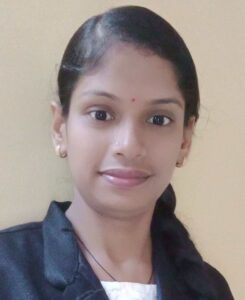

Mr. Sujit S. Pawar
Laboratory Assistant
12th Science, B.A.
Hindi & Geography
Year of Joining 1998

Mr. Kisan Virnak
Laboratory Assistant
10th
Year of Joining 1998

Mr. Aniket Ghosalkar
Laboratory Assistant
B.A. History
Year of Joining 2004

Mr. Nitin Karjeevkar
Laboratory Assistant
10th
Year of Joining 2013
F.Y.B.Sc.
| Semester | Course | Course code | Weightage | Credit |
Syllabus |
|
I |
Chemistry | USCH101 | 100 | 2 | FYBSc Chemistry |
| Chemistry | USCH102 | 100 | 2 | ||
| Chemistry Practical | USCHP1 | 100 | 2 | ||
|
II |
Chemistry | USCH201 | 100 | 2 | |
| Chemistry | USCH202 | 100 | 2 | ||
| Chemistry Practical | USCHP2 | 100 | 2 |
S.Y.B.Sc.
| Semester | Course | Course code | Weightage | Credit |
Syllabus |
|
III |
Chemistry | USCH301 | 100 | 2 | SYBSc CHemistry |
| Chemistry | USCH302 | 100 | 2 | ||
| Basics of Analytical Chemistry | USCH302 | 100 | 2 | ||
| Chemistry Practical | USCHP3 | 150 | 3 | ||
|
IV |
Chemistry | USCH401 | 100 | 2 | |
| Chemistry | USCH402 | 100 | 2 | ||
| Basics of Analytical Chemistry | USCH402 | 100 | 2 | ||
| Chemistry Practical | USCHP4 | 150 | 3 |
T.Y.B.Sc.
| Semester | Course | Course code | Weightage | Credit | Syllabus |
|
V |
Physical Chemistry | USCH501 | 100 | 2.5 |
View Syllabus |
| Inorganic Chemistry | USCH501 | 100 | 2.5 | ||
| Organic Chemistry | USCH501 | 100 | 2.5 | ||
| Analytical Chemistry | USCH501 | 100 | 2.5 | ||
| Chemistry Practical | USCHP05 | 100 | 3 | ||
| Chemistry Practical | USCHP05 | 100 | 3 | ||
| Applied Component- Pharmaceutical Chemistry | USACDD501 | 100 | 2 |
View Syllabus |
|
| Applied Component – Pharmaceutical Chemistry-Practical | USACHDD5P1 | 100 | 2 | ||
|
VI |
Physical Chemistry | USCH601 | 100 | 2.5 |
View Syllabus |
| Inorganic Chemistry | USCH601 | 100 | 2.5 | ||
| Organic Chemistry | USCH601 | 100 | 2.5 | ||
| Analytical Chemistry | USCH601 | 100 | 2.5 | ||
| Chemistry Practical | USCHP06 | 100 | 3 | ||
| Chemistry Practical | USCHP06 | 100 | 3 | ||
| Applied Component – Pharmaceutical Chemistry | USACDD601 | 100 | 2 |
View Syllabus |
|
| Applied Component – Pharmaceutical Chemistry-Practical | USACHDD6P1 | 100 | 2 |
Postgraduate Programmes (Unaided)
- M.Sc. (Organic Chemistry) by Papers (40 Seats)
- M.Sc. (Analytical Chemistry) by Papers (20 Seats)
- M.Sc. (Organic Chemistry) by Research (07 Seats)
M.Sc. Chemistry (By Papers)
| Semester | Course | Course code | Weightage | Credit | Syllabus |
|
I |
Physical Chemistry | PSCH 101 | 100 | 4 | |
| Inorganic Chemistry | PSCH 101 | 100 | 4 | ||
| Organic Chemistry | PSCH 101 | 100 | 4 | ||
| Analytical Chemistry | PSCH 101 | 100 | 4 | ||
| Chemistry Practical | PSCHP 101- PSCHP 104 | 200 | 8 | ||
|
II |
Physical Chemistry | PSCH 201 | 100 | 4 | |
| Inorganic Chemistry | PSCH 201 | 100 | 4 | ||
| Organic Chemistry | PSCH 201 | 100 | 4 | ||
| Analytical Chemistry | PSCH 201 | 100 | 4 | ||
| Chemistry Practical | PSCHP 201- PSCHP 204 | 200 | 8 |
M.Sc. (Organic Chemistry)
| Semester | Course | Course code | Weightage | Credit | Syllabus |
|
III |
Theoretical Organic Chemistry | PSCHO301 | 100 | 4 | MSc Organic Chemistry Sem III & IV |
| Synthetic Organic Chemistry | PSCHO302 | 100 | 4 | ||
| Natural Products and Spectroscopy | PSCHO303 | 100 | 4 | ||
| Medicinal and Bio-Organic Chemistry | PSCHO304 | 100 | 4 | ||
| Practicals |
PSCHO3P1 – PSCHO3P4 |
200 | 8 | ||
|
IV |
Theoretical Organic Chemistry | PSCHO401 | 100 | 4 | |
| Synthetic Organic Chemistry | PSCHO402 | 100 | 4 | ||
| Natural Products and Spectroscopy | PSCHO403 | 100 | 4 | ||
| Medicinal and Bio-Organic Chemistry | PSCHO404 | 100 | 4 | ||
| Practicals |
PSCHO4P1 – PSCHO4P4 |
200 | 8 |
M.Sc. (Analytical Chemistry)
| Semester | Course | Course code | Weightage | Credit | Syllabus |
|
III |
Quality in Analytical Chemistry | PSCHA301 | 100 | 4 | MSc Analytical Chemistry Sem III & IV |
| Advanced Instrumental Techniques | PSCHA302 | 100 | 4 | ||
| Environmental & Certain Industrially Important Materials | PSCHA303 | 100 | 4 | ||
| Pharmaceutical, Biochemical & Organic Analysis | PSCHA304 | 100 | 4 | ||
| Practicals | PSCHA 3P1
– PSCHA 3P4 |
200 | 8 | ||
|
IV |
Quality in Analytical Chemistry |
PSCHA401 | 100 | 4 | |
|
Advanced Instrumental Techniques |
PSCHA402 | 100 | 4 | ||
|
Environmental & Certain Industrially Important Materials |
PSCHA403 | 100 | 4 | ||
|
Pharmaceutical, Biochemical & Organic Analysis |
PSCHA404 | 100 | 4 | ||
| PSCHA 4P1
– PSCHA 4P4 |
200 | 8 |
Programme Outcomes
B.Sc.
PO1. CRITICALTHINKING
The curriculum is designed in such way that students should acquire an ability to observe accurately and objectively. They should be able to solve the problems and also think scientifically, independently and draw rational conclusions.
PO2. SCIENCE COMMUNICATION
Curriculum empowers communication skills in science which further enhances easy spread of scientific knowledge in the society.
PO3 SOCIAL INTERACTIONS
Students acquire national integration, community harmony, gender equality and nationalism which inculcate harmonized social interaction. Made aware of environment related issues.
PO4 EFFECTIVE CITIZENSHIP
Students acquire attributes of good citizens with certain ethics, made aware of environmental issues its management and planning.
PO5 ALLROUND PERSONALITY
Students develop as all-round individuals possessing variety of values and skills conferred by extracurricular activities.
M.Sc.
PO1. CRITICALTHINKING
The curriculum is designed in such way that students should acquire an ability to observe accurately and objectively. They should be able to solve the problems and also think scientifically, independently and draw rational conclusions.
PO2. SCIENCE COMMUNICATION
Curriculum empowers communication skills in science which further enhances easy spread of scientific knowledge in the society.
PO3 SOCIAL INTERACTIONS
Students acquire national integration, community harmony, gender equality and nationalism which inculcate harmonized social interaction.
PO4 EFFECTIVE CITIZENSHIP
Students acquire attributes of good citizens with certain ethics, made aware of environmental issues its management and planning.
PO5 ALLROUND PERSONALITY
Students develop as all-round individuals possessing variety of values and skills conferred by extracurricular activities.
PO6
Integration of convergent and divergent thinking ability, which makes the students to differentiate between myth and realities and enable to develop new solutions for problems
PO7
Students acquaint with research attitude and able to find out research problems. They understand global, environmental and ethical issues by interdisciplinary kind of research
PO8
Students instill baseline thinking required for employment and entrepreneurship.
PO9
Students acquire skills in handling scientific instruments, planning and performing scientific experiments.
Programme Specific Outcomes and Course Outcomes
B.Sc.
| Program Specific Outcomes of B.Sc. Chemistry | |
| Upon completion of B.Sc. Program in Chemistry the students will be able to:
PSO1 Estimate the chemical composition of any material PSO2 Describe the set of particle properties PSO3 Identify suitable pharmaceutical dyestuff intermediate PSO4 Operate analytical instruments. PSO5 Examine the physical parameters of substances PSO6 Infer energy change associate with physical and chemical changes PSO7 Outline the strength of acids and bases PSO8 Prepare new substances PSO9 Analyse ores and alloys PSO10 Predict behaviour of substances |
|
| Course Code | Course Outcomes |
| USCH101 | Upon completion of this course the students will be able to:
CO1 Describe thermodynamic terms CO2 Compute Concentration in various forms CO3 Summarises atomic structure evolution CO4 Explain Periodic Properties CO5 Elaborate IUPAC rules of naming of organic compounds CO6 Discuss reaction mechanism |
| USCH102 | Upon completion of this course the students will be able to:
CO1 Count the rate of reaction CO2 Predict properties of liquids CO3 Outline the properties of main group elements CO4 State environmental properties of Oxides and Oxyacids of N & S CO5 Convert molecule in different projection formulae CO6 Infer reasons optical of activity |
| USCH201 | Upon completion of this course the students will be able to:
CO1 Discuss the laws of gases CO2 Determine Equilibrium and thermodynamic parameters CO3 Explain concepts of qualitative analysis CO4 Outline Acid Base Theories CO5 Illustrate Carbon-Carbon sigma and pi bonding CO6 Explain reactions of alkene and alkynes |
| USCH202 | Upon completion of this course the students will be able to:
CO1 Estimate pH of buffer solutions CO2 Relate interaction between matter with electromagnetic radiation CO3 Outline chemical bonding and reactivity CO4 Describe redox chemistry CO5 Design three dimensional model of molecules CO6 Summerizes chemistry of aromatic compounds |
| USCHP1 | Upon completion of this course the students will be able to:
CO1 Estimate strength of commercial acid CO2 Examine percentage composition of mixtures CO3 Design double indicator titration CO4 Infer purification technique CO5 Apply chromatographic technique CO6 Operate qualitative identification technique of organic compounds |
| USCH301 | Upon completion of this course the students will be able to:
CO1 Discuss partial molal properties CO2 Summarises conductivity and resistivity CO3 Outline non directional and directional bonding CO4 Apply molecular orbital theory CO5 Illustrate reactivity of halogenated hydrocarbon CO6 Differentiate between alcohols phenol and epoxides |
| USCH302 | Upon completion of this course the students will be able to:
CO1 Predict theories of reaction kinetics CO2 Discuss Nernst distribution law CO3 Understand chemistry of p block elements CO4 Classify silicon and germanium w.r.t their reactivity CO5 Generalise nucleophilic addition reaction mechanism CO6 Examine reactivity of active methylene compounds |
| USCH303 | Upon completion of this course the students will be able to:
CO1 Discuss the role of analytical chemistry in various fields CO2 Apply method of sampling and statistical treatment of data CO3 Demonstrate classical methods of analysis CO4 Identify suitable gravimetric or volumetric method CO5 Summarises various instrumental methods of analysis CO6 Appreciate basic terms in spectroscopy |
| USCH401 | Upon completion of this course the students will be able to:
CO1 Distinguish between reversible and irreversible cell CO2 Understand phase equilibria CO3 Compare transition metal chemistry CO4 Evaluate qualitative tests for transition metal ions CO5 Outline properties of coordination compounds CO6 Explain reactivity of carboxylic and sulphonic acids |
| USCH402 | Upon completion of this course the students will be able to:
CO1 Appreciate terms in crystallography CO2 Explain the concepts of catalysis CO3 Design the behaviour of ions in aqueous medium CO4 Demonstrate uses of environmental chemistry CO5 Show the chemistry of nitrogen containg heterocycles CO6 Prepare and use of diazonium salts |
| USCH403 | Upon completion of this course the students will be able to:
CO1 Outline the types of separation methods CO2 Apply solvent extraction technique CO3 Utilise statistical method of data analysis CO4 Appreciate nature need and importance of pH CO5 Computation of confidence limit and confidence interval CO6 Utilise conductometric titration |
| USCHP2 | Upon completion of this course the students will be able to:
CO1 Judge the Ostwald’s dilution law CO2 Estimate hardness of water CO3 Prepare organic compounds CO4 Use of pH to locate the end point of acid base titration CO5 Analyse inorganic salts qualitatively by semi micro method CO6 Operate conductometer and potentiometer |
| USCH501 | Upon completion of this course the students will be able to:
CO1 Discuss colligative properties of dilute solutions CO2 Apply phase rule to two component system CO3 Analyse types of adsorption isotherm CO4 Explain Catalyst poisoning and deactivation CO5 Develop Concentration Cell CO6 Utilise EMF measurement CO7 Distinguish types of polymers CO8 Summarise laws of crystallography |
| USCH502 | Upon completion of this course the students will be able to:
CO1 Explain concept of Point groups CO2 Apply molecular orbital theory CO3 Discuss structures of solids CO4 Calculate limiting radius coordination no 4 CO5 Illustrate lanthanide series CO6 Rewrite actinide chemistry CO7 Elaborate chemistry of non-aqueous solvents CO8 Classify solvents |
| USCH503 | Upon completion of this course the students will be able to:
CO1 Generalise the reaction mechanism CO2 Rewrite name reaction CO3 Predict Molecular Chirality CO4 Apply stereochemistry t addition reactions CO5 |
M. Sc.
| Programme Specific Out Comes | ||
| PSO1
Infuse in the learner a spirit of inquiry into the fundamental aspects of the various core areas of Organic Chemistry. |
||
| PSO2
Impart the advanced practical and theoretical knowledge to the students and develop the scientific skills among them to be useful in the Concerned field. |
||
| PSO3
Train students and make them eligible for accessing integrated multidimensional fields. |
||
| POS4
Anticipate new/upcoming areas in chemical science. |
||
| POS5
Give the learner an opportunity to get hands on experience of the various concepts and processes in the various branches of chemistry |
||
| POS6
Impart various skills of handling chemicals, reagents, apparatus, instruments and the care and safety aspects involved in such handling |
||
| POS7
Make the learner capable of analysing and interpreting results of the experiments he conducts or performs |
||
| POS8
Make the learner capable of acquiring or pursuing a source of livelihood like jobs in chemical industry |
||
| POS9
Arouse the interest to pursue higher levels of learning in chemistry |
||
| Course | Course Outcomes | |
| Semester I and II,
Paper-I (Physical Chemistry) |
CO1
Outline fundamental principles of Physical Chemistry. CO2 Explain basic concept of thermodynamics theories and Principles CO3 Describe basic concepts and applications of third law of thermodynamics CO4 Describe basic concepts quantum chemistry and applications. CO5 Describe basic concepts of chemical kinetics, polymerization reactions, enzyme catalysed reactions, soils and gas phase reactions. CO6 Explain concept of real solutions, fugacity of real gases, surface chemistry and their application to life processes. CO7 Explain concept of phase rule and its application to two phase and three phase system. CO8 Describe basic concepts electrochemistry and applications to batteries and biological processes. of third law of thermodynamics CO9 Explain concept of phase rule and its application to two phase and three phase system. |
|
| Semester I and II
Paper-I Practicals (Physical Chemistry) |
CO1
Illustrate applications of techniques such as pH metry, Conductometry, Potentiometry, Colorimetr and Spectrophotometry. CO2 Study correlation of theoretical principles of quantum mechanics, chemical thermodynamics and kinetics by performing hands on experiments. |
|
| Semester I and II,
Paper-II (Inorganic Chemistry) |
CO1
Outline fundamental principles of Inorganic Chemistry. CO2 Explain basic concept chemical bonding, hybridisation and different attractive processes. CO3 Describe basic concepts molecular symmetry and applications of group theory CO4 Describe basic concepts solid state chemistry and material science. CO5 Explain concept of spectral and magnetic properties of d and f block elements. CO6 Explain basic principles of inorganic reaction mechanism, substitution, redox reactions with stereochemistry CO7 Describe basic concepts of Organometallic Chemistry of Transition metals CO8 Explain role of metal ion Fe, Cu, N, Pt in biologically active compounds like Hb, Mb, cytochromes and enzymes. CO9 Describe Environmental Chemistry with respect to heavy metal toxicity and radioactive emissions. |
|
| Semester I and II
Paper-II Practicals (Inorganic Chemistry) |
CO1
Illustrate applications of techniques like spectrophotometer, flame photometer, conductometer in inorganic analysis etc. CO2 They are trained to handle various equipments like spectrophotometer, conductometer etc. |
|
| Semester I and II,
Paper-III (Organic Chemistry) |
CO1
Outline fundamental principles of Organic Chemistry. CO2 Explain basic concept Organic reaction mechanism and methods of determining the mechanism. CO3 Describe basic concepts aliphatic and aromatic nucleophilic substitution CO4 Describe basic concepts aromaticity, HMO theories. CO5 Explain concept of steroechemistry. CO6 Explain different oxidising and reducing agents with respect to mode of action, selectivity and applications CO7 Describe basic concepts enolate ion chemistry CO8 Explain important rearrangement reactions with respect to mechanism and applications CO9 Describe basic concepts of organic spectroscopic methods such as UV-Visible, IR, NMR, 1HNMR and 13CNMR. |
|
| Semester I and II
Paper-III Practicals (Organic Chemistry) |
CO1
Illustrate one step synthesis of organic compounds including some heterocycles. CO8 Describe basic concepts planning and designing of organic synthesis. CO2 Illustrate concepts of TLC used as a tool to confirm purity of the products formed.. CO3 Describe basic concepts separation of liquid and solid organic binary mixtures. CO4 Describe basic concepts laboratory safety techniques and handling of chemicals. |
|
| Semester I and II,
Paper-IV (Analytical Chemistry) |
CO1
Outline fundamental principles of Analytical Chemistry. CO2 Explain basics of language of analytical chemistry with respect to errors involved, safety in laboratories and quality in CO3 Describe basics of calculations based on chemical principles CO4 Describe basic concepts optical instrumentation methods such as FTIR, UV-Visible Spectroscopy. CO5 Explain concept different thermal methods such as TGA, DTA, DSC.. CO6 Explain basic concepts of chromatographic techniques. CO7 Describe basic concepts of some advanced instrumentation techniques such as X-ray, Mass and radioanalytical mehods CO8 Explain important analytical methods such as Surface Analytical Techniques and atomic spectroscopic techniques CO9 Describe basic concepts of some electroanalytical methods such as ion selective potentiometry, polarography, polarography, electrogravimetry and coulometry. |
|
| Semester I and II
Paper-IV Practicals (Analytical Chemistry) |
CO1
Explain concepts of preparation of various solutions, handling of different chemicals CO2 Infuse skills to be enable to work as quality control chemist in various labs and such organizations. |
|
| Semester III and IV,
Paper-I (Theoretical Organic Chemistry) |
CO1
Outline fundamental principles of Organic Chemistry. CO2 Explain basic concept Organic reaction mechanism and intermediates involved. CO3 Describe basic concepts pericyclic reactions such as electrocyclisation, cycloaddition, sigmatropic, chelotropic and group transfer. CO4 Describe some advanced concepts of stereochemistry such as conformational analysis of ring compounds stereochemistry of fused ring systems and dynamic stereochemistry.. CO5 Explain concept of photochemistry of carbonyl compounds, olefins, arenes etc.. CO6 Describe basic concepts physical organic chemistry such as structure activity relationship and related theories. CO7 Explain concepts of supramolecular chemistry CO8 Describe some advanced concepts of stereochemistry such as methods of determining enatiomeric and diastereoisomeric composition, different correlation methods and chiroptical properties CO9 Describe some advanced concepts asymmetricsynthesis |
|
| Semester III and IV
Paper-I Practicals |
CO1
Explain concepts of separation of ternary mixtures of different physical composition, CO2 Outline the techniques of purification, checking purity by TLC, determine physical constant and calculate percentage yield. |
|
| Semester III and IV,
Paper-II (Synthetic Organic Chemistry) |
CO1
Outline fundamental principles of synthetic Organic Chemistry. CO2 Explain some important name reactions w.r.t. mechanism and applications. CO3 Describe basic protection, deprotection and umpolung synthesis CO4 Describe use of enamines and ylides in organic synthesis CO5 Explain applications of some metals and non-metals in organic synthesis CO6 Describe use of organic radicals in organic synthesis CO7 Explain concepts designing of organic synthesis with examples of some natural products. CO8 Describe some advanced methods of organic synthesis such as use of crown ethers, cryptands, micelles, cyclodextrins, clay, zeolites and phase transfer catalyst. CO9 Explain applications of some transition and non-transition metals in organic synthesis |
|
| Semester III and IV
Paper-II Practicals |
CO1
Explain concepts of extraction of different natural products such as clove oil, nicotine from their sources, CO2 Explain the techniques of estimations of some natural products such as glucose, protein, citral, natural oil, penicillin, vitamin C etc. CO3 Explain the techniques of estimations of some pharmaceutical formulations such as streptomycin, paracetamol, aspirin, diazepam etc. |
|
| Semester III and IV,
Paper-III (Natural Product and Spectroscopy) |
CO1
Outline fundamental principles of Heterocyclic chemistry. CO2 Describe important Natural products such as carbohydrates, lipids, pigments, pheromones, vitamins, steroids etc. CO3 Describe the fundamentals and applications of advanced spectroscopic techniques such as IR, NMR etc. |
|
| Semester III and IV
Paper-III Practicals |
CO1
Explain concepts of preparation of various organic compounds, CO2 Explain the planning of synthesis, effect of reaction parameters including stoichiometry, and safety aspects including MSDS, the possible mechanism, expected spectral data (IR and NMR) of the starting material and final product. CO3 Outline the techniques of purification, checking purity by TLC, determine physical constant and calculate percentage yield. |
|
| Semester III and IV,
Paper-IV (Medicinal and Bioorganic Chemistry) |
CO1
Outline fundamental principles of Drug discovery & Drug development. CO2 Describe different systems of medicine, sources of drugs, history of drug discovery, lead discovery and development , pharmacophore identification, toxicological evolution and clinical trials, pharmacokinetics & pharmacodynamics, routes of drug administration and formulation CO3 Outline the fundamentals and applications of eco-friendly approach of synthesizing chemicals (Green Chemistry) CO4 Describe the designing synthetic plan, reducing potential risk, minimising environmental pollution& cost effective manufacturing processes. CO5 Describe role of various biomolecules such as enzymes, co-enzymes, amino acids, nucleic acids, carbohydrates etc. |
|
| Semester III and IV
Paper-IV Practicals |
CO1
Explain concepts of different separation techniques such as steam distillation, vaccume distillation, column chromatography etc. CO2 Explain the techniques of greener methods of synthesis using domestic microwave. CO3 Explain the applications of combined spectroscopic techniques such as IR, PMR, CMR, Mass and UV in structural elucidation of unknown organic compound. |
|
| Semester III and IV,
Paper-I (QUALITY IN ANALYTICAL CHEMISTRY) |
CO1
Outline fundamental principles of Organic Chemistry. CO2 Explain basic concept Organic reaction mechanism and intermediates involved. CO3 Describe basic concepts pericyclic reactions such as electrocyclisation, cycloaddition, sigmatropic, chelotropic and group transfer. CO4 Describe some advanced concepts of stereochemistry such as conformational analysis of ring compounds stereochemistry of fused ring systems and dynamic stereochemistry.. CO5 Explain concept of photochemistry of carbonyl compounds, olefins, arenes etc.. CO6 Describe basic concepts physical organic chemistry such as structure activity relationship and related theories. CO7 Explain concepts of supramolecular chemistry CO8 Describe some advanced concepts of stereochemistry such as methods of determining enatiomeric and diastereoisomeric composition, different correlation methods and chiroptical properties CO9 Describe some advanced concepts asymmetricsynthesis |
|
| Semester III and IV
Paper-I Practicals (Instrumental Analysis) |
CO1
Explain concepts of separation of ternary mixtures of different physical composition, CO2 Outline the techniques of purification, checking purity by TLC, determine physical constant and calculate percentage yield. |
|
| Semester III and IV,
Paper-II (ADVANCE INSTRUMENTAL TECHNIQUES) |
CO1
Outline fundamental principles of synthetic Organic Chemistry. CO2 Explain some important name reactions w.r.t. mechanism and applications. CO3 Describe basic protection, deprotection and umpolung synthesis CO4 Describe use of enamines and ylides in organic synthesis CO5 Explain applications of some metals and non-metals in organic synthesis CO6 Describe use of organic radicals in organic synthesis CO7 Explain concepts designing of organic synthesis with examples of some natural products. CO8 Describe some advanced methods of organic synthesis such as use of crown ethers, cryptands, micelles, cyclodextrins, clay, zeolites and phase transfer catalyst. CO9 Explain applications of some transition and non-transition metals in organic synthesis |
|
| Semester III and IV
Paper-II Practicals (Analysis of medicinals ,Organic analysis, Biochemical analysis) |
CO1
Explain concepts of extraction of different natural products such as clove oil, nicotine from their sources, CO2 Explain the techniques of estimations of some natural products such as glucose, protein, citral, natural oil, penicillin, vitamin C etc. CO3 Explain the techniques of estimations of some pharmaceutical formulations such as streptomycin, paracetamol, aspirin, diazepam etc. |
|
| Semester III and IV,
Paper-III (ENVIRONMENTAL AND CERTAIN INDUSTRIALLY IMPORTATNT MATERIAL) |
CO1
Outline fundamental principles of Heterocyclic chemistry. CO2 Describe important Natural products such as carbohydrates, lipids, pigments, pheromones, vitamins, steroids etc. CO3 Describe the fundamentals and applications of advanced spectroscopic techniques such as IR, NMR etc.
|
|
| Semester III and IV
Paper-III Practicals (Analysis of Food and oil samples) |
CO1
Explain concepts of preparation of various organic compounds, CO2 Explain the planning of synthesis, effect of reaction parameters including stoichiometry, and safety aspects including MSDS, the possible mechanism, expected spectral data (IR and NMR) of the starting material and final product. CO3 Outline the techniques of purification, checking purity by TLC, determine physical constant and calculate percentage yield. |
|
| Semester III and IV,
Paper-IV (Pharmaceutical, Biochemical and organic analysis) |
CO1
Outline fundamental principles of Drug discovery & Drug development. CO2 Describe different systems of medicine, sources of drugs, history of drug discovery, lead discovery and development , pharmacophore identification, toxicological evolution and clinical trials, pharmacokinetics & pharmacodynamics, routes of drug administration and formulation CO3 Outline the fundamentals and applications of eco-friendly approach of synthesizing chemicals (Green Chemistry) CO4 Describe the designing synthetic plan, reducing potential risk, minimising environmental pollution& cost effective manufacturing processes. CO5 Describe role of various biomolecules such as enzymes, co-enzymes, amino acids, nucleic acids, carbohydrates etc. |
|
| Semester III and IV
Paper-IV Practicals (Metallurgy and water Analysis) |
CO1
Explain concepts of different separation techniques such as steam distillation, vaccume distillation, column chromatography etc. CO2 Explain the techniques of greener methods of synthesis using domestic microwave. CO3 Explain the applications of combined spectroscopic techniques such as IR, PMR, CMR, Mass and UV in structural elucidation of unknown organic compound. |
|
Learning Resources of the Department
- Under Graduate Chemistry Lab (FY and SY)- (725 Sq Feet)
- Under Graduate Chemistry Lab (TY)- (725 Sq Feet)
- Post-graduate Chemistry Wet lab-(700 Sq Feet)
- Instrumentation lab-(322 Sq Feet)
- Consultancy laboratory (258 Sq Feet)
- Faculty rooms with Wi-Fi Facility (180 Sq Feet)
Teaching Aids
Students have access to various molecular model making kits and audio-visual teaching aids including a CD collection which includes 700+ ebooks.
Major instruments
- Double Beam Atomic Absorption Spectrophotometer (Elico)
- Double Beam UV-Visible Spectrophotometer (Systronics)
- Single Beam UV-Visible Spectrophotometer (Systronics)
- Single Beam UV-Visible Spectrophotometer (Equip-Tonic)
- Digital Balance (Contech One 4 Digit and two 3 Digits)
- Flame Photometer (Systronics)
- 2 Desktop computers, 1 Laptop and 1 Printer
|
Name of Teacher |
Year |
Agency |
Title of the project |
Amount Sanctioned (Rs) |
|
Dr. G. B. Sathe |
2008-2009 |
University of Mumbai |
Synthesis and Characterization of Ligand and Study of Its Metal Complexes with Co(II), Ni(II) and Cu(II), |
26,000 |
|
2009-2011 |
UGC-WRO |
.Studies on Synthesis, Characterization and Applications of Novel Schiff Base Ligand, |
02, 00, 000 |
|
|
2011-2012 |
Mumbai University |
.Studies on Synthesis, Characterization and biological evaluation of Novel Schiff Base Ligand and its transition metal complexes, |
25,000 |
|
|
2014-2015 |
Mumbai University |
Spectrophotometric Studies of the Complexes of Second Transition Series Elements with Schiff Base |
25,000 |
|
|
Mrs. G. S. Gore |
2011-2012 |
Mumbai University |
Study of metal complexes of thiocarbohydrazide derivatives |
20,000 |
|
2016-2018 |
UGC-WRO |
Synthesis and Characterization of N,N-dimethylaminobenzaldehyde derived isonitrosopropiophenonecarbahydrazide ligand and its metal complexes, |
2,60,000 |
|
|
2016-2017 |
Mumbai University |
Studies on some aromatic aldehyde derived derived from isonitropropiophenone carbahydrazide ligand and their Biological Activities |
30, 000 |
|
|
Prof. K. V. Gandhi |
2012-2013 |
Mumbai University |
Microvave assisted synthesis of new heterocyclic compounds |
27,400 |
|
Prof. S. S. Marathe |
2012-2013 |
Mumbai University |
Synthesis and Characterization of Schiff Bases and Studies of their Biological Activities |
27,400 |
|
2016-2017 |
Mumbai University |
Microwave Assisted Synthesis and Characterization of Double Schiff Bases and evaluation of their Biological Activities, |
30, 000 |
|
|
Dr. B. A. Yamgar |
2014-2015 |
Mumbai University |
Spectroscopic characterization of azo metal chelates |
15,000 |
|
2016-2018 |
UGC-WRO |
Spectroscopic Properties of azo metal chelates |
2,60,000 |
M.Sc Semester I
M.Sc Semester II
M.Sc Semester III(Analytical)
M.Sc Semester III(Organic)
M.Sc Semester IV(Analytical)
M.Sc Semester IV(Organic)
Name of The Faculty |
Name of Institute |
|
|
1 |
Dr. G. A. Meshram |
University Department of Chemistry, Kalina |
|
2 |
Dr. S. M. Malushte |
Sathye College, Mumbai |
|
3 |
Dr. S. S. Mangoakar |
Mithibai College, Mumbai |
|
4 |
Dr. Rajesh Kamble |
University Department of Chemistry, Kalina |
|
5 |
Prof. A. A. Abhyankar |
Dr. Babasaheb Ambedkar, Mahad |
|
6 |
Mrs. Aparna Kulkarni |
Gogate College, Ratnagiri |
|
7 |
Dr. Mayur Desai |
Gogate College, Ratnagiri |
|
8 |
Dr. H. A. Parbat |
Wilson College, Mumbai |
|
9 |
Dr. Sagar Sankpal |
Athalye Sapre College, Deorukh |
|
10 |
Dr. Hemant Chavan |
Athalye Sapre College, Deorukh |
|
11 |
Mr. C. L. Prabhu |
S. H. Kelkar College, Deogad |
|
12 |
Mr. Ajit Kanshide |
Sant RaulMaharaj College, Kudal |
|
13 |
Mr. Vijay Gurav |
Gogate College, Ratnagiri |
|
14 |
Mr. Nilesh Korgoakar |
Institute of Chemical Technology, Mumbai |
|
15 |
Mr. Sadanand Chitnis |
Bhausaheb Nene College, Pen |
|
16 |
Miss. Sujata Pawar |
Gogate College, Ratnagiri |
|
Class |
Year |
Students Appeared |
Students Passed |
% Result |
‘O’ Grade |
‘A’ Grade |
‘B’ Grade |
‘C’ Grade |
|
T. Y. B. Sc. |
2012-2013 |
41 |
21 |
51.22% |
1 |
8 |
12 |
– |
|
2013-2014 |
46 |
32 |
69.56% |
– |
11 |
14 |
7 |
|
|
2014-2015 |
41 |
37 |
90.24% |
2 |
12 |
14 |
9 |
|
|
2015-2016 |
47 |
26 |
55.32% |
3 |
10 |
10 |
3 |
|
|
2016-2017 |
34 |
32 |
94.11% |
3 |
22 |
7 |
– |
|
|
M. Sc.-II |
2012-2013 |
20 |
15 |
75% |
– |
3 |
12 |
– |
|
2013-2014 |
13 |
13 |
100% |
– |
6 |
4 |
3 |
|
|
2014-2015 |
22 |
19 |
86.36% |
– |
2 |
6 |
11 |
|
|
2015-2016 |
20 |
14 |
70% |
3 |
3 |
6 |
2 |
|
|
2016-2017 |
47 |
27 |
57.44% |
2 |
11 |
12 |
2 |
Department is planning to start research programmes.
Department run soil, water, leaf, petioles and fertilizer testing consultancy service in college. Through this consultancy the college has made collaboration with Soil Conservation Department of Government of Maharashtra. The Government Department sends soil samples collected from farmers to our college for micronutrient evaluation and other parameters. The college has set-up laboratory with modern sophisticated instruments facilities.
- Industrial Visits & Industrial Trainings
- Seminars, Conferences & Workshops
- Students seminars
- Guest Lectures
- Mentoring by Alumini
- Extra Lectures
- Bridge & Remedial Programmes for Slow / Medium / Advanced Learners
- Parent Meetings
- Tutorials / Class Tests
- Home Assignments
- Linkages- industrial linkages/visits, MOUs,
- Students Placement
- Students Mentoring
- Workshops / Seminars / Conferences
Chemistry Graduates & Post Graduate can enter a wide range of professions such as:
- Pure and applied research
- Teaching
- Government Services
- Quality Control, Quality assurance & Research and development in industry
- Management, production, packaging, marketing and sales, in industries such as pharmaceuticals, foods, dyes, cosmetics, polymer, Chemical, etc.
- Consumer guidance, Nutritional consultancy, Science journalism
- Chemistry software development, Chemistry literature indexing
- Entry in civil services through competitive Examinations (UPSC, MPSC etc.)
- Entrepreneur



